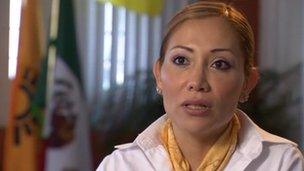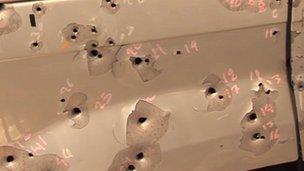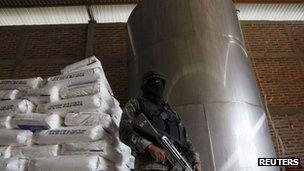Mexico election: Drugs war in spotlight in Michoacan
- Published
Rosa Isela Caballero Garcia, the wife of a Mexican journalist missing for more than five years, says not knowing if he is dead or alive is like "physical torture"
There is an area of western Mexico called Tierra Caliente.
The name is a reference to the soporific and oppressive heat in the region. But in this part of the world, caliente can also mean "dangerous" as well as "hot".
Unfortunately, for many residents in the state of Michoacan, "Dangerous Land" is an all-too-accurate description of their towns and villages.
It was here that the government declared war on the drug cartels.
In December 2006, barely a week after taking office, President Felipe Calderon ordered 6,500 troops into his home state to restore order after a surge in drug-related killings.
Many had expected the army's deployment to be temporary.
Fast-forward almost six years, and the soldiers are still there, fighting drug traffickers on the Pacific coast and in the mountains. In fact, there are more than ever.
Earlier this year the government sent a further 4,000 troops into the state.
"The majority of Mexicans have said they don't want the government to surrender to organised crime," says presidential candidate Josefina Vazquez Mota.

Josefina Vazquez Mota on the campaign trail in Michoacan
Speaking to the BBC shortly before addressing a rally in Sahuayo, a small town in the north of Michoacan, she readily admits that the military strategy has not been easy, but argues that it was the only choice.
"There weren't many alternatives. Either we handed over Mexico's families to organised crime or we fought back."
Synthetic drugs
Ms Vazquez Mota is Mexico's first female candidate for a major political party, and is running for Mr Calderon's governing National Action Party (PAN).
But far from being his heir apparent, she is doing everything she can to distance herself from the incumbent. Her campaign slogan is a single word: Different.
Except when it comes to security.
Ms Vazquez Mota advocates continuity with Mr Calderon's approach, promising to keep the army on the streets and set up a national police force to replace the hundreds of corrupt and inefficient municipal forces around the country.
She acknowledges that Mexicans "want less violence, fewer deaths".
For her, police reform is one of several "new strategies we must employ to reduce violence".
But reducing violence in the Tierra Caliente will not be easy.
Michoacan is the centre of the lucrative methamphetamine trade in Mexico.
Unlike cocaine, which is produced in the Andes, methamphetamine or "glass" is made in Mexico.
'Crazy cartels'
As it fast becomes the drug of choice from campuses to crack-houses across the US, the battle for control of the pharmaceutical product involves some of the most brutal cartels operating in Mexico.
Among them are the pseudo-religious drug gang, La Familia Michoacana, who have their own bizarre, rambling creed for the "salvation" of their foot-soldiers.
They are at war with a more powerful splinter group called the Knights Templar.
The consequences of such internecine conflicts can be seen every week, says a veteran journalist working in the region, as he shows us photos of bodies dumped on roadsides or hung from bridges, their twisted limbs folded at strange angles beneath them.
"These were just over the past fortnight," he tells us.
Some of the corpses had been dismembered, others had threatening messages attached to them as warnings to rival gangs.
Many of the dead had their trousers pulled down in one final humiliation.
One woman who has personal experience of the drug violence in Michoacan is left-wing politician Minerva Bautista.
In April 2010, while serving as Michoacan's public security secretary, La Familia Michoacana tried to assassinate her.

Minerva Bautista is staying in politics despite an assassination attempt by a drug cartel.
That she survived the attempt on her life is one of the most extraordinary escapes in the country's drug war.
As she left the annual state fair, her car was blocked on the road by a trailer.
She and her entourage were then ambushed by 20 armed men, mostly teenagers, she recalls, who fired on her vehicle for 15 minutes with machine guns, sub-automatic weapons and grenades.
In the attack, two of her bodyguards were killed, as well as two bystanders, and almost 3,000 rounds of ammunition were fired on her car.
Miraculously, Ms Bautista emerged shaken but unharmed.
"I don't remember much about the attack, it was unreal, surreal."
The car's armour-plating, the quick-thinking of her bodyguards and sheer good fortune saved her life, she says.

More than 3,000 rounds of ammunition were fired at Minerva Bautista's vehicle
"In a twist of fate, the grenades didn't explode. The car was already badly damaged and had the grenades gone off, that would have been the end of us."
Rather than flee Michoacan, however, she returned to public life a few months later and is now standing for mayor in the state capital, Morelia.
Asked if she thinks Operation Michoacan has worked, Ms Bautista is emphatic.
"No, definitively not. We are now talking of thousands of families who have been abandoned, children and young people who have been orphaned and people who have disappeared."
'Two Mexicos'
Over sticky soft drinks, I chat with the crime reporter who showed us the photos of the latest violence in the region, most of which were too gruesome to publish.
He has covered drug cartels for 23 years and has been kidnapped twice himself.

Mexican authorities have uncovered an increasing number of drugs labs in recent months
As we sip our soft drinks in the shade, he points out that we are barely a block away from the site of one of the most brazen acts of violence of the past six years.
On Mexican Independence Day, 15 September 2008, the main square in Morelia was packed with celebrating crowds.
As the proceedings reached their climax, in which the state governor shouts the Cry of Independence ,"Viva Mexico!", three times from his balcony, an armed group threw two grenades into the crowd killing eight and injuring dozens.
Could there have been any clearer statement from the cartels to the authorities, the journalist asks rhetorically.
"People who don't live here don't understand", he says. "There are two Morelias, two Michoacans, two Mexicos."